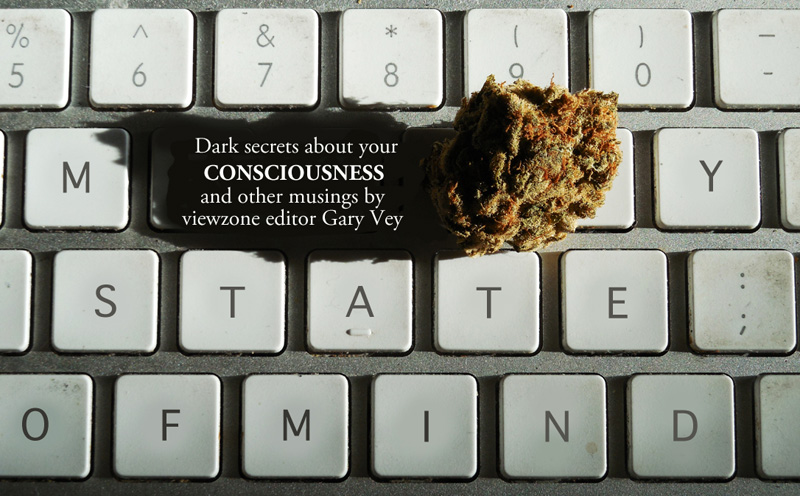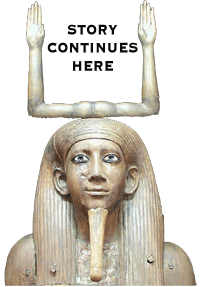
I am he as you are he as you are me
And we are all together -- Beatles
As promised, I am going to try and explain, in my own words, what Julian Jaynes, a Princeton professor, took almost five hundred pages to do. Here's a link to download the book (pdf) should you want to follow along with me.
What I am going to explain should blow your mind in two phases. First, you will not believe what I am saying until you try some mental exercises yourself. Then, with some effort, you will understand yourself and the world in a different way. That's the first phase of this story.
The second phase comes when you try to integrate your new perspective with familiar realities, like what this life is really all about. It changes just about everything, yet you will likely manifest no outward changes in your behavior. It's all inside.
I'll tell you what I am going to tell you
Perhaps you won't understand this now, but here is a preview:
Your (our) consciousness is just a mental fabrication that is the result of our language having developed the ability to give a verbal narrative to reality. What's more, consciousness is a fairly recent development of the human mind, although unsuccessful attempts may have occurred in the remote past.
How recent is the evolution of our consciousness? Jaynes provides pretty convincing evidence that this mental upgrade happened just about 3000 years ago! I know... it is hard to believe. But wait for the supporting evidence before you trash this story. Once you consider this fact to be a possibility, you soon begin to unravel the ancient mystery cults, ancient myths and legends, the oracles, shaman and, yes, hypnotism, psychedelics and circumcision. It all falls in place once you make it over this first impasse.
This isn't all that I could tell you right now, but it is the hardest part to digest and we can proceed no further until this is understood. Jaynes devoted the first part of his book to describing consciousness -- what it is and what it isn't. And with his guidance we can use our own minds to validate these claims. Then we can proceed on solid ground. OK, ready?
Consciousness
We use the word to mean a variety of things. Here is the dictionary definition:
consciousness
|
Most of us usually think of our consciousness as being who we are. I am aware that I am aware... as you are also. This function seems unique to humans and apparently necessary for us to have dominated lesser life forms which have no consciousness, such as plants and animals.
OK. Before you start thinking I am dissing plants or animals, saying they don't have consciousness, we need to focus more on what we precisely mean by this word. Is your pet dog in possession of self-awareness? How about those experiments (Baxter et. al) where it was demonstrated that plants have feelings? [*]
That's not exactly what we are talking about here.
If I asked you to make a list of things that require consciousness you might just answer "everything", but here are a few specific items that might come to your mind:
- speaking (writing, reading and listening)
- learning
- making judgements and decisions
- simple thinking and problem solving
So let's use our own minds as a laboratory and examine these mental abilities. I have outlined some of Jaynes' arguments. Take each one separately and use your own experience to see if you agree with what he proposes:
Consciousness in not needed for Speaking, Reading, Writing and Listening
Right now you are reading this text. You probably have a little voice in your mind that is reading the words, as if the story were being read for you. You are aware of your eyes tracking the words, moving from left to right... and every now and then perhaps a visual image, stimulated by the text, will flash in your inner cinema...
But let's look at what is really happening. Your eyes are constantly moving, much more than you know. Your body movements and the coordination of your eye's muscles create lots of jitters to the image forming on your retina. You don't notice this because a kind of program adjusts for these movements and provides you with a stabilized picture.
Next, the image of the page is interpreted by the firing of rods and cones that send signals to your visual cortex where it is recognized as text. Each letter or word is recognized and its meaning is understood in the context of other words and phrases. Subtle things like humor, the choice of words etc., add your reaction to the meaning.
Only then does this reach your consciousness as a verbal narrative, paired with reports on the status of your other systems (emotions, hormones etc.). This forms your reality.
The point I want to make is that the hardest parts of reading and listening are done in the background. Our consciousness is just the final recipient of a kind of summary from a host of unconscious and largely automatic processing functions.
As far as writing and speaking, even more miraculous things happen in the background. We form ideas based on previous input, these ideas are put into logical statements, translated into words, corrected according to linguistic rules in memory and executed precisely with the correct tonality and the appropriate delivery for the imagined audience.
As I write this text I am experiencing the process. The words are coming into my consciousness from somewhere behind that curtain. I watch in amazement as my fingers find the right keys. The correct choice and order of words streams out. I feel a kind of invigoration when I know the words are expressing my general idea correctly. "I" (my consciousness) am a kind of witness and quality control to what is happening!
Consciousness does not take an active part in creativity, it mostly just witnesses it.
Musicians tell of songs coming to their consciousness from "somewhere", usually all finished and ready to record! Some of the greatest discoveries in science and philosophy have been brought into consciousness suddenly and usually when the person involved was not thinking about the problem (Archimedes' Eureka moment, Farnsworth, Einstein, Tesla...).
Jaynes jokes about the three greatest environments of intellectual discovery as the three B's: bath, bed, bus. But I'm getting ahead of myself. Let's consider that it is possible to listen, speak, read and write without the consciousness actively participating. All of the hard thinking is done unconsciously and the consciousness just experiences the narrative.
If you're not convinced, hang in there. Next we will look at learning. Surely this requires consciousness?
OK. Later.
